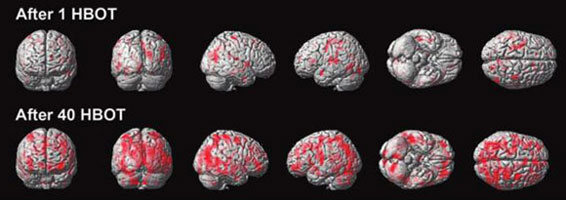As reported earlier, the Department of Veterans Affairs (“the VA”) is now providing hyperbaric oxygen therapy of “HBOT” on a trial basis to Veterans with PTSD and TBI. This marks an abrupt turnaround within the VA that has repeatedly claimed that there is insufficient clinical “evidence” to support the use of HBOT in treating Veterans with brain injuries.

The VA’s position reportedly stems from some 32 “inconclusive” studies on the effectiveness of HBOT in treating TBI and PTSD. Most recently, the 2015 DoD trial of HBOT concluded that there was a “lack of evidence” that HBOT helped Veterans with PTSD or TBI.
Col. Miller, the DoD project manager, “didn’t see any value in moving forward with more studies.” As SFTT reported earlier, Col. Miller is an infectious disease specialist and not a brain trauma specialist. Fortunately, he now works for the Gates Foundation focusing on his specialty: infectious disease.
The VA and the DoD go to great lengths to discredit the use of HBOT in treating Veterans with brain injury. Nevertheless, their arguments seem rather spurious against the almost overwhelming scientific evidence that HBOT is effective in helping to improve brain functionality.
Some in the medical profession have questioned whether test protocols in the DoD 2015 study were manipulated to produce the “inconclusive” outcome. More to the point, how is it possible for the VA to continue to defend its ONLY two non-invasive therapy programs: Prolonged Exposure Therapy (“PE”) and, Cognitive Processing Therapy (“CPT”)? Patient outcomes for these two programs have been shown by independent studies to be next to useless.
In fact, so abysmal have been therapy results that the VA used highly addictive prescription drugs to treat the symptoms of PTSD and TBI rather than provide any long term cure. Indeed, the VA has no small role to play in contributing to the opioid epidemic which is now ravaging America.
Hopefully, the lack of any meaningful success in treating PTSD and TBI has forced the VA to accelerate its exploration of alternative therapies. Hopefully, HBOT will soon be incorporated into the treatment options currently provided to Veterans by the VA.
While Dr. David Cifu and his cronies at the VA may continue to put out disingenuous statements regarding HBOT, it is widely used all over the world to treat trauma. Specifically, HBOT is the “go-to” option for the Israel Defense Forces (IDF). As reported in an earlier SFTT article, Daniel Rona, who has fought with both the IDF and US military states that in Israel:
“In essence, our mental attitude is that we must take care of ourselves and through that process little Israel has become a blessing for the rest of the world…we treasure our soldiers, young and old. They are our only defenders….no one else will fight our battles. You can imagine that every concussive event will be treated with HBOT !” . . .“the policy of the IDF is that life has the highest value and they are committed to use any treatment, in any case, to save a life”.
Furthermore, as Dr. Paul Harch and others have pointed out, there are many independent scientific studies confirming the benefits of HBOT. Specifically, Dr. Xavier Figueroa has written a compelling argument suggesting that the VA has dropped the ball on HBOT research.
There is plenty of anecdotal evidence to suggest that Veterans are seeking treatment centers all across the United States. In many cases, clinics are opening their doors to Veterans to help them recover from the silent wounds of war. Nevertheless, the treatment can be quite expensive as remains out of financial reach for most Veterans.
While Veterans and their support givers cope with this devastating war wound, SFTT remains hopeful that HBOT and other alternative therapy programs will soon be adopted by the VA to help these brave Veterans recover their lives.
Found below is an old (2012) but compelling video (caution, it takes a while to load) from a TV Station in Louisiana (WWL.com) which shows the remarkable recovery of Maj. Ben Richards mental and motor skills after having received treatment from Paul Harch:
While HBOT may not be “right” solutions for all Veterans suffering from brain injury, it does seem a far more compelling treatment alternative to the ineffective programs currently offered by the VA. More to the point, HBOT is non-invasive which suggests that we won’t have a new generation of addicts to contend with given failed VA programs.
ShareJAN
2018

About the Author:
STAND FOR THE TROOPS ("SFTT") is a 501(c)(3) educational foundation dedicated to safeguarding the physical and emotional well-being of America’s military personnel. Currently, our most pressing mission is to investigate and connect veterans to result-oriented treatments for the Traumatic Brain Injuries (TBI) and Post Traumatic Stress Disorder (PTSD) now triggering so many military suicides.